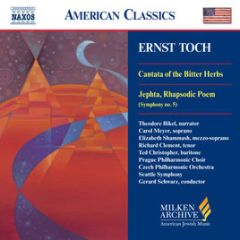Ernst Toch - Cantata of the Bitter Herbs ∙ Jephta (2004)
Ernst Toch - Cantata of the Bitter Herbs ∙ Jephta (2004)

Cantata Of The Bitter Herbs 1 Introduction And Psalm 114 6:12 2 Sheheheyanu 1:34 3 Children's Dance 1:52 4 The Ten Plagues 1:59 5 And It Was At Midnight 2:25 6 Aria 4:07 7 Psalm 126 7:17 8 He Saved My Soul From Death 1:59 9 God Of Right, God Of Might 8:25 10 Hymn 3:43 - 11 Jephta, Rhapsodic Poem (Symphony No. 5) 25:26 Theodore Bikel - narrator Carol Meyer - soprano Elizabeth Shammash - mezzo-soprano Richard Clement - tenor Ted Christopher - baritone Prague Philharmonic Choir (tracks: 1 to 10) Czech Philharmonic Orchestra (tracks: 1 to 10) Seattle Symphony (tracks: 11) Gerard Schwarz - conductor
“Fetters fell, the captive rose. Old is the memory of Israel’s escape from Egypt. Told and retold for thousands of years, the story has given strength to the weary, hope to the disheartened.” Thus begins Toch’s Cantata of the Bitter Herbs, a unique musical-dramatic work begun during the great German-Jewish composer’s forced exile to the United States, and premiered in Los Angeles in the midst of World War Two. Toch’s retelling of the Passover story is cast as an appeal for universal justice and liberation from oppression. The composer’s ultimately triumphant vision is set to luminous late Romantic music and includes a solo quartet that recalls the beauty of the famous trio from Der Rosenkavalier. ---naxos.com
"Ernst Toch? Oh, yeah. He's the guy who wrote 'The Geographical Fugue.'" That's about all we knew about the man, we who, during the late 50s and early 60s, performed Toch's opus for spoken choir. In fact, Toch referred to himself as "the world's most forgotten composer." He was one of the "degenerate" composers (read "Jewish") whose music was forbidden by Hitler and the Third Reich. He emigrated to America in 1934 and, like many others driven out of Europe by the Nazis, found a niche in Hollywood writing film scores, for which he received three Oscar nominations. But his concert music found little audience in America, a source of frustration and disillusionment. Fortunately, between 1947 and his death in 1964 he produced seven symphonies and some pieces for strings. He received a Pulitzer Prize for his Third Symphony in 1956, and Symphony No. 5 - "Jeptha, Rhapsodic Poem" - is included on this recording. (All seven symphonies are available on the CPO label, conducted by Alun Francis.) Oh, yes. "The Geographical Fugue" can be heard on The Turtle Creek Chorale's album POSTCARDS.
Toch initially wanted to compose an opera based upon the biblical story of Jeptha and his daughter, but instead abandoned the project and wrote a one-movement symphony ". . . describing in abstract instrumental terms the unfolding of the biblical story . . . its tragic conflicts, and the emotional impact of its dilemma." It appears that the Israelites asked the warrior Jeptha to help them defeat the Ammonites. Jeptha ". . . made a vow to God that if He would deliver the Ammonites into his hands, he would demonstrate his gratitude by sacrificing . . . whatever was the first to emerge from his house upon his return." Well, as luck would have it, that "first" happened to be his daughter, his only child. Talk about dilemmas! Gerald Schwartz and the Seattle Symphony do a masterful job in bringing this music to life.
Although "Jeptha" may take a few listenings to be appreciated, not so "Cantata of the Bitter Herbs." It's immediately accessible. Taking his inspiration from the Passover hagadda, Toch ". . . conceived this work as transcending the confines of Jewish history and experience to express a universal theme: the equal injustice of all human oppression throughout the world. . . " Except for an aria sung in Hebrew, there's nothing about this piece that sounds remotely "Jewish." Charlie Richards writes in his review that it reminds him of Strauss or Zemlinsky. I hear Brahms, perhaps, or Mendelssohn. (My favorite movement is Psalm 126 for chorus and tenor and soprano duet: "When Adonai brought back his children to Zion, it would be like a dream, and the melodies would fill our tongue and the laughter our mouth." Sublime!) "Bitter Herbs" is an absolutely stunning piece of music, one that should find its way into the repertoire of our major orchestras, especially around Passover/Easter time. Perhaps then Ernst Toch would be less "forgotten."
I'm giving the recording 5 stars, although I quibble over the low recording level of "Bitter Herbs" and the pronunciation of the English text by the Prague Philharmonic Choir. (I'm sure a citizen of Prague would have the same criticism of an American choir singing in Czech.) It's a "shanda" that economics prohibits recording many of the works in the Milken Archive series in America. "American Jewish Music" recorded practically everywhere but America. ---J. T Waldmann, amazon.com
download (mp3 @320 kbs):
yandex mediafire ulozto gett bayfiles








